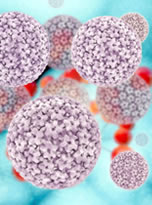Read and report vaccine reactions, harassment and failures.
Who is at highest risk for suffering complications from HPV?

Risk factors for developing cancer, including HPV associated cancers, differ depending upon the cancer type, personal health, and lifestyle choices including those related to smoking, drinking and diet. That said, having one or more risk factors (or no risk factors) does not necessarily determine whether or not cancer will develop.
At highest risk of suffering HPV infection complications are the less than ten percent of women and men who do not naturally clear high-risk HPV infections and therefore, become chronically infected.
According to the National Cancer Institute, factors that can increase the risk of developing cancer following chronic infection with high-risk HPV types include:
- Smoking
- Having a weakened immune system
- Diagnosis with an aggressive HPV type
The American Cancer Society lists the following risk factors for developing cervical cancer (after years of undiagnosed and untreated chronic infection with high risk HPV types):
- Smoking
- Immunosuppression
- Chlamydia Infection
- Poor diet and obesity
- Long term oral contraceptive use
- Multiple full-term pregnancies (three or more)
- Young age (under 18 years old) at the first full term pregnancy
- Poverty/lack of access to Pap tests
- Women whose mothers took the hormonal drug Diethystilbestrol (DES) during pregnancy (1940-1971)
- Family history of cervical cancer
Oral cavity and oropharyngeal cancers:
- Tobacco use, including chewing tobacco
- Alcohol use
- Heavy drinking and smoking
- HPV infection
- Gender (men at greater risk)
- Age (over age 55)
- UV Light
- Poor nutrition
- Genetic syndromes
Anal cancer:
- HPV infection
- Other genital cancers (increased risk for women)
- HIV infection
- Multiple sexual partners
- Smoking
- Lowered immunity
- Race and gender
Vaginal and vulvar cancers:
- HPV infection
- Cervical precancer or cervical cancer
- Weakened immune system
- Smoking
- Chronic vulvar itching or burning
Penile cancer:
- HPV infection
- Poor hygiene combined with lack of circumcision
- Smoking and other tobacco use
- UV light treatment of psoriasis
- Age (over age 55)
- AIDS
IMPORTANT NOTE: NVIC encourages you to become fully informed about HPV and the HPV vaccine by reading all sections in the Table of Contents , which contain many links and resources such as the manufacturer product information inserts, and to speak with one or more trusted health care professionals before making a vaccination decision for yourself or your child. This information is for educational purposes only and is not intended as medical advice.



